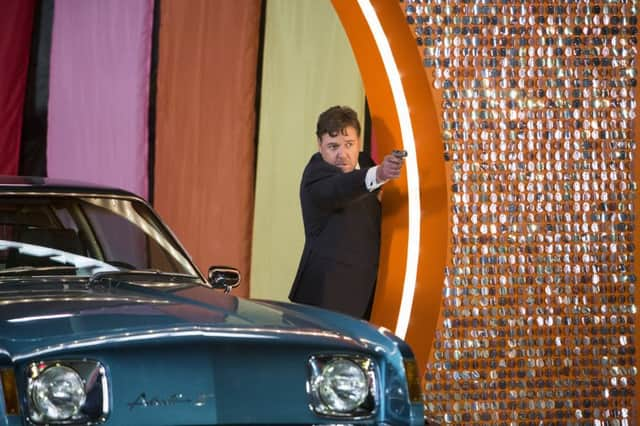Film review: The Nice Guys | Warcraft | Me Before You


People allergic to fun in movies used to write off Shane Black, obsessing over the money he was paid for scripting odd couple action comedies like Lethal Weapon, The Long Kiss Goodnight and The Last Boy Scout instead of recognising his ability to craft wittily hardboiled dialogue, instantly relatable characters, genre-subverting plots and high-octane shoot-outs. Since taking charge of his own material with Kiss Kiss Bang Bang, however, the writer-turned-director has ramped up his love of language, turning quip-and-kill mayhem into a deliriously deranged artform that’s as likely to throw discussions about correct grammar usage into the mix as it is explosions and gunplay. The Nice Guys (****) sees him fine tune that formula in ever more outrageous ways with a pair of incompetent private investigators trying to solve a murder mystery in 1970s Los Angeles. It’s a setting that allows Black to put a flat-out funny spin on the neo-noir intrigue of era classics such as Chinatown and The Long Goodbye. It also allows him to bring out the best in stars Russell Crowe and Ryan Gosling, who chew over Black’s delicious one-liners while embracing period garb: the former riffing on his burly tough guy image in girth-accentuating street threads, the latter rocking a porn ‘tache, aviator shades and three-piece-suits with hideous ties. Crowe plays Jackson Healy, a tough-guy-for-hire whose job breaking limbs for people who can’t go to the police leads him to the door of Gosling’s private detective, Holland March. He’s been trailing Healy’s client, Amelia (Margaret Qualley), a young woman mixed up in the porn industry who also happens to have family connections that reach into the upper echelons of the Justice Department. After making each other’s acquaintance in face-punching, arm-snapping ways, they decide to team up upon realising their cases are connected by the death of a famous porn star, whose demise is depicted in spectacularly weird fashion in the film’s opening minutes.
In tribute to Raymond Chandler, the ensuing plot is wilfully convoluted, to the point where it doesn’t always hold up to too much scrutiny. That’s OK, though, because this is a detective film that interrogates the tropes of the genre and revels in their comedic consequences. March, for instance, is a terrible detective. Frequently soused on bourbon, he literarily falls into clues, but, like Healy, he’s got a vague idea of what’s right and both smell something rotten about this candy-coloured world they move through. Their investigation is aided by March’s wise-beyond-her-years 13-year-old daughter, Holly, who becomes the moral centre of their universe, reining in their more deplorable excesses, but providing plenty of laughs in her own right (she’s played with endearing precocity by young Australian actress Angourie Rice). Black marshals the tone perfectly, veering from comedy to consequence-heavy violence with a precision that makes the outlandishness fly even more smoothly. The Nice Guys is smart-dumb fun for grown-ups, a mainstream summer palate-cleanser amidst the glut of Spandex-clad superheroes.
Advertisement
Hide AdThere are no superheroes in Warcraft (*), but this expensive-looking blockbuster is based upon a mega-selling video game, source material filmmakers have yet to successfully turn into compelling cinema. Hopes were somewhat high for Warcraft thanks to the presence of Moon director Duncan Jones. Sadly, from the first line about an eternal battle raging between orcs and humans, it becomes apparent that Jones hasn’t made the first great videogame movie, but a film that harks back in spirit — if not budget — to all those rubbish post-Star Wars sci-fi fantasy adventures like Krull and Hawk the Slayer. Jones does move the camera around in interesting ways that replicate the gaming experience, but the mythology is too impenetrable and the cast (which includes Ben Foster and Dominic Cooper) struggle to communicate why we should care about a CGI-rendered world full of big-toothed creatures that look like those pig guards from Return of the Jedi. Game of Thrones this ain’t.
Nor is Me Before You (*), though it does feature that show’s Emilia Clarke doing heroic work in a new romantic sub-genre: the euthanasia weepy. She plays Lou, a naïve but happy-go-lucky 26-year-old who takes a job as a carer for a good-looking quadriplegic man (Sam Claflin) who doesn’t see the point in living any more. It’s corny as hell, and pretty tasteless too, ruthlessly building up to its final hashtag hankie moment.
Having just won this year’s Palme d’Or for what promises to be his swansong, I, Daniel Blake, it’s easy to forget that Ken Loach went for more than a decade without making a film. Versus: The Life and Films of Ken Loach (***) offers a timely overview of a career defined by his opposition to a system that would probably rather he never made another. Using the production of his latest as a jumping off point, it traces his creative evolution from his days as an unassuming Oxford law student who just loved acting to a TV director whose political conscience was awoken the more interested he became in giving a voice to the under-represented. There are interesting insights here about the making of landmark films such as Cathy Come Home and Kes, and a reminder as well of his contretemps with the Royal Court. There are also some heartbreaking family revelations and a wee mea culpa for the advertising work he did for Nestlé and McDonald’s in the late 1980s and early 1990s, when he claims he couldn’t get any other work. It’s a useful primer, in other words, but it does tend to negate any legitimate assessment of his work by suggesting criticism of it is politically motivated.